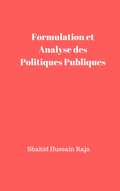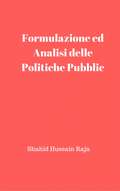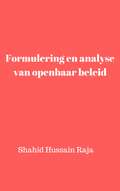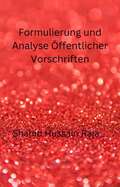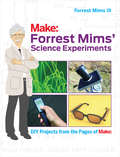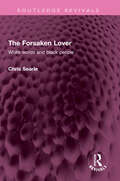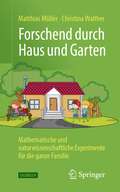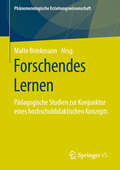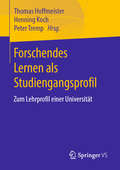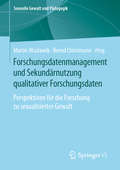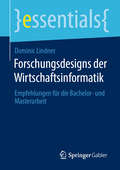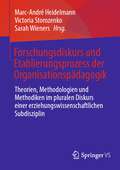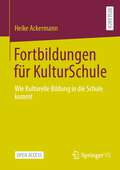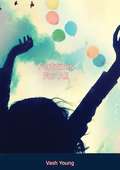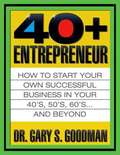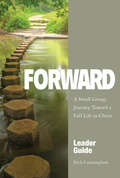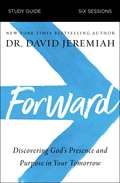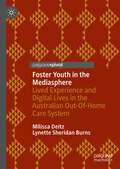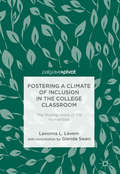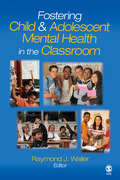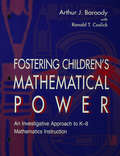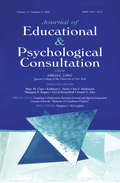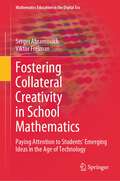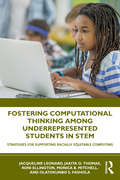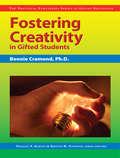- Table View
- List View
Formulation et Analyse des Politiques Publiques
by Shahid Hussain RajaQu’est-ce qu’une politique publique, pourquoi et comment sont-elles formulées et quelles sont les caractéristiques d’une bonne politique publique? Cet ouvrage définit ce qu’est une politique publique et en décrit les différentes caractéristiques. Il énumère les étapes et les procédures adoptées en matière de formulation d’une politique publique dans un pays. Il explique ensuite les caractéristiques d’une bonne politique publique et s’achève par l’examen du processus des politiques publiques dans un pays en voie de développement comme le Pakistan.
Formulazione ed Analisi delle Politiche Pubbliche
by Loris Palmitesta Shahid Hussain RajaDefinisce cos'è un Politica Pubblica nelle sue varie caratteristiche. Definisce i passaggi necessari e le procedure adottate nella formulazione di una politica pubblica in una nazione. In seguito spiega le caratteristiche di una buona politica pubblica termine con un esame del processo delle politiche pubbliche in un paese in via di sviluppo come il Pakistan.
Formulering en analyse van openbaar beleid
by Shahid Hussain RajaGedurende de afgelopen jaren heeft openbaar beleid over de hele wereld om diverse redenen veel aandacht in de academische kringen gekregen. Naast het tonemende bewustzijn over de rol en het aanpakken van de veelzijdige uitdagingen waarmee elk land geconfronteerd wordt, is de belangrikste reden voor deze interesse in openbare beleidskwesties de steeds assertievere rol van de maatschappelijke organisaties en de media. Ze willen weten hoe openbaar beleid dat een gewone man raakt, geformuleerd wordt en de manier waarop het bestuursapparaat werkt, zodat ze ingelichte oordelen kunnen maken en ingelichte maatregelen kunnen nemen. De formulering van het openbaar beleid heeft de afgelopen drie of vier decennia een metamorfe verandering onderggan als gevolg van de snel globaliserende wereld. Er zijn minstens vier manieren waarop globalisering de beleidsformulering in elk land beïnvloedt. Ten eerste, dankzij sociale en elektronische media, worden kleine problemen die een decennium of zo geleden alleen op de achterpagina van een nationale krant geplaatst konden worden, breaking news op de belangrijkste wereldwijde kanalen, waardoor belangbehartiging en sympathie bewegingen in verschillende delen van de wereld ontstonden. Ten tweede, met de snel globaliserende wereld, worden mondiale kwesties zoals aantasting van het milieu, klimaatverandering, GMO, enz., die alleen in de wandelgangen van de macht besproken worden, in de salons van landen besproken en sterke belangbehartigingingsbewegingen onder de bevolking scheppen. Ten derde, verschuiven de centra van feitelijke macht en besluitvorming van lokaal naar mondiaal niveau met het bereik van binnenlandse belangengroepen naar hun sympathisanten in internationale organisaties, multinationals en die in de regeringen van mondiale mogendheden. Deze outreach stelt hen in staat hun eigen regering te dwingen om aan hun eisen te voldoen vanwege de economishe en politieke invload van de mondiale spelers.
Formulierung und Analyse Öffentlicher Vorschriften
by Shahid Hussain RajaDefiniert den Begriff der öffentlichen Ordnung und beschreibt ihre verschiedenen Facetten, listet die Schritte und Verfahren auf, die zur Formulierung einer öffentlichen Ordnung in einem Land erforderlich sind, erklärt die Merkmale einer guten öffentlichen Ordnung und endet mit der Untersuchung des Prozesses der öffentlichen Ordnung in einem Entwicklungsland wie Pakistan.
Forrest Mims' Science Experiments: DIY Projects from the Pages of Make:
by MimsForrest M. Mims is a revered contributor to Make: magazine, where his popular columns about science-related topics and projects for Makers are evergreen treasures. Collected together here for the first time, these columns range from such simple projects as building an LED tracker for hand-launched night rockets to such challenging builds as transforming strings of data into unique musical compositions.A variety of photography and imaging projects are featured, including an ultra-sensitive twilight photometer that measures the elevation of layers of dust, smoke, and smog from around 3,000 feet to the top of the stratosphere at 31 miles! Most of the projects can be done with a collection of simple electronic components, such as LEDs, transistors, resistors, and batteries. To inspire and motivate readers, the book also includes profiles of such famous Makers as President Thomas Jefferson and Microsoft co-founder Paul Allen.
The Forsaken Lover: White words and black people (Routledge Revivals)
by Chris SearleFirst published in 1972, The Forsaken Lover draws upon Chris Searle’s experience as an English teacher in a secondary school in Tobago to focus upon the deep problems of identity encountered by black people having to use the white man’s language. He shows how the white man’s language is primarily interested in vindicating the white man’s pride and culture, and denying the black man his true autonomy. Black children are still being educated within a cultural context which denies them their own identity – in order to succeed they must become as white as possible. In the Forsaken Lover (the title comes from a poem written by a West Indian girl). Chris Seale presents a lively and direct account of his experience. The book is full of the children’s own writing – poetry, prose, drama – and, by referring to their words, Searle urges the need for change in policies and attitudes of language and education. The immediate context is Caribbean, but the issues are common to all societies where differences of colour, class and environment exist. The book will be of interest to students of race and ethnic relations, education, linguistics and public policy.
Forschend durch Haus und Garten: Mathematische und naturwissenschaftliche Experimente für die ganze Familie
by Matthias Müller Christina WaltherDieses Buch lädt mit 20 „alltäglichen“ Experimenten die ganze Familie zum Forschen und Entdecken im häuslichen Umfeld ein: Die teils offenen Fragen fordern zu genauem Beobachten und systematischer Auseinandersetzung mit den mathematischen und naturwissenschaftlichen Zusammenhängen auf; die Erkenntnisse und die dazugehörigen wissenschaftlichen Konzepte werden im Anschluss beschrieben und eingeordnet, regen aber zugleich dazu an, eigenständig weitere Fragestellungen zu entwickeln. Den erzählerischen Rahmen bilden liebevoll geschilderte Geschichten, die Menschen jeden Alters zu einem aufmerksamen und forschenden Blick im eigenen Alltag ermutigen. Denn ob in Küche, Bad oder Garten: Wer mit offenen Augen durch die Welt geht, wird überall spannende Forschungsobjekte finden und entsprechende Fragen stellen – egal, ob es um perfekte Stöpsel, leuchtende Pflanzen oder nimmervolle Fässer geht. Die beschriebenen Experimente können zuhause mit alltäglichen bzw. leicht zu beschaffenden Gegenständen und Materialien durchgeführt werden; sie wurden im Rahmen des Schülerforschungszentrums in Jena praktisch erprobt und evaluiert. Die vorgeschlagene Entdeckungsreise kann allein oder auch gemeinsam mit der Familie (Geschwister, Eltern, Großeltern etc.) unternommen werden.
Forschendes Lernen: Pädagogische Studien zur Konjunktur eines hochschuldidaktischen Konzepts (Phänomenologische Erziehungswissenschaft #10)
by Malte BrinkmannDas Verhältnis von Theorie, Politik und Praxis des forschenden Lernens als Begriff, hochschuldidaktisches Konzept und intersubjektive Handlungsform steht im Zentrum dieses Bandes. Er zielt auf eine kritische Aufarbeitung, Rekonstruktion und Reflexion des forschenden Lernens in bildungs- und praxistheoretischer, phänomenologischer, wissenschaftstheoretischer sowie in hochschul- und allgemein-didaktischer Perspektive. Es werden darüber hinaus produktive Ausblicke für eine Neubestimmung des Verhältnisses von Forschen, Lehren und Lernen in akademischen Kontexten und für die Lehrer/-innenbildung gegeben. Der InhaltForschendes Lernen und die Normalisierung des pädagogischen Blicks • Forschungsnahes Lehren und Lernen an Hochschulen in der Denkfigur des didaktischen Dreiecks • Zum Verhältnis von Lernen und Forschung im Studium: Bildungstheoretische, didaktische und phänomenologische Perspektiven • Anwenden als Forschen • Über Hochschuldidaktik aus der Sicht einer allgemeinen Wissenschaftsdidaktik • Den Musterwechsel anbahnen. Die Praxis in Schule und Unterricht forschend erkundenDer HerausgeberDr. Malte Brinkmann ist Professor am Institut für Erziehungswissenschaft der Humboldt-Universität zu Berlin.
Forschendes Lernen als Studiengangsprofil: Zum Lehrprofil einer Universität
by Thomas Hoffmeister Henning Koch Peter Tremp„Universität des Forschenden Lernens“: Mit diesem Anspruch hat die Universität Bremen in den letzten Jahren ihre Lehrangebote und damit ihr Lehrprofil weiterentwickelt. Die Publikation präsentiert anregende Beispiele und konkretisierende Hinweise zur Umsetzung dieses Postulats. Erörtert werden Modelle und Konzeptionen des Forschenden Lernens als Studiengangsprofil, diskutiert werden Möglichkeiten der Übertragbarkeit. Die Publikation leistet damit einen praxisorientierten Beitrag zur Curriculumentwicklung an Hochschulen und nimmt Fragen auf, die sich an allen Hochschulen mit grosser Dringlichkeit stellen.
Forschungsdatenmanagement und Sekundärnutzung qualitativer Forschungsdaten: Perspektiven für die Forschung zu sexualisierter Gewalt (Sexuelle Gewalt und Pädagogik #6)
by Martin Wazlawik Bernd ChristmannDer Band nimmt Fragestellungen zum Umgang mit Forschungsdaten zu sexualisierter Gewalt auf und versucht eine Bestimmung notwendiger forschungsethischer Positionen. Es geht dabei auch um den Beitrag, den Sekundärauswertungen von qualitativen Materialbeständen zu Forschungsfragen leisten können, die methodischen und methodologischen Limitationen und forschungsethischen Herausforderungen sowie um die Problematik, dabei die Selbstbestimmung und Selbstdeutungshoheit von Betroffenen von sexualisierter Gewalt unter einer Partizipationsperspektive zu wahren.
Forschungsdesigns der Wirtschaftsinformatik: Empfehlungen für die Bachelor- und Masterarbeit (essentials)
by Dominic LindnerIn diesem Buch werden Grundlagen zur empirischen Sozialforschung erläutert und Empfehlungen zur Findung eines Themas für die Abschlussarbeit gegeben. Anschließend werden vier Forschungsdesigns vorgestellt, ergänzt durch Tipps für die Kooperation mit einem Praxispartner. Empfehlungen zum Umgang mit Themen wie Plagiat und Zitierweise runden das Essential ab. Die Inhalte sollen Studierenden aus dem Bereich der Betriebswirtschaft und der Wirtschaftsinformatik als Hilfestellung bei der Konzeption und Erstellung einer Abschlussarbeit dienen.
Forschungsdiskurs und Etablierungsprozess der Organisationspädagogik: Theorien, Methodologien und Methodiken im pluralen Diskurs einer erziehungswissenschaftlichen Subdisziplin
by Marc-André Heidelmann Victoria Storozenko Sarah WienersDer Band greift den pluralen Forschungsdiskurs zur Organisationspädagogik auf und zeigt den Etablierungsprozess der noch jungen Subdisziplin in der deutschsprachigen Erziehungswissenschaft.Dargestellt werden theoretische ebenso wie methodologische und methodische Aspekte organisationspädagogischer Forschung. Neben ästhetischen, partizipativen und diskursmethodologischen Forschungszugängen, werden insbesondere auch Fragen organisationspädagogischer Professionalisierung sowie das wichtiger werdende Feld organisationspädagogischer Organisations- und Netzwerkberatung als Anwendungsfeld organisationspädagogischen Wissens zum Gegenstand gemacht. Die Beiträge sind Frau Professorin Dr. Susanne Maria Weber und ihrem akademischen Werk gewidmet.
Fortbildungen für KulturSchule: Wie Kulturelle Bildung in die Schule kommt
by Heike AckermannIn diesem Open-Access-Buch gibt eine Evaluationsstudie Auskunft, wie teilnehmende Lehrkräfte Fortbildungen erleben, die auf die KulturSchul-Entwicklung zielen. Welche Perspektiven bauen diese auf? Und welche internen Unterstützungsmaßnahmen trifft die Schule, damit sich die Lernkultur ändern kann? Die Fortbildungsreihen im Landesprogramm «KulturSchule Hessen» legen die Grundlage dafür, dass Lehrkräfte über eindrückliche ästhetische Erfahrungen ein leibhaftiges Verständnis dieses Querschnittsthemas Kulturelle Bildung entwickeln. Sie erfahren in kreativen Prozessen, wie sich eine neue Sicht auf das Selbst, die Welt und Dinge, die uns umgeben, ergibt. Zugleich erweitert sich ihr bisheriges Unterrichtsrepertoire und Lernverständnis. Ihr Blick richtet sich stärker auf die Lernprozesse ihrer Schülerinnen und Schüler und die Lernumgebung: „Das ist tatsächlich für beide – also für Pädagogen als auch für Schüler – ein irres Erlebnis, wenn man Dinge anders angeht, als man es vorher gemacht hat“, so ein Fortbildungsteilnehmer am «Fachforum».
Fortunes For All
by Vash YoungHOW TO BE HAPPIER AND MORE SUCCESSFUL BY SIMPLE CHANGES IN MENTAL ATTITUDEThis is the sixth book Vash Young has written to share with others the philosophy responsible for the success and happiness he has enjoyed. His other books were bestsellers, and FORTUNES FOR ALL is undoubtedly his most important work. First published in 1959, it written during Vash Young’s active retirement at the age of 70, when he was able to look back over his amazing life and career and speak with the voice of one who conquered the obstacles of fear, inhibition, and failure to become the successful salesman of $80 million worth of life insurance and lead a full, rich life by applying his philosophy for happiness.“I know I have a good key to happiness because I have used it personally with almost unbelievable results.”“This state of mind has not grown old and useless. It is more potent within me today than back in the depression years when I was changing the thinking of thousands of distressed individuals.”“…we can see the human body, which has a chemical value of approximately 97 cents. But we do not see the thinking which motivates a human body. This thinking may be worth $500,000.”“All of the scientific advances being made are of very little use to the individual and his personal problems….Self-help is what he needs most of all, and that is what I am trying to supply in this book.”FORTUNES FOR ALL seeks to bring together the background, philosophy and methods that had secured Vash Young’s fortune as a handbook for generations to follow.
The Forty-Plus Entrepreneur: How to Start Your Own Successful Business In Your 40's , 50's, 60's...and Beyond
by Gary S. GoodmanAt age 90 Jack Smiley wasn't thrilled with the community in which he retired, so he built his own. Today it provides him with a net income of $40,000 each month. Famously, KFC's 65-year-old Kentucky Colonel Harlan Sanders supplemented a paltry Social Security check by franchising his unique recipe for fried poultry. Past 50, McDonald's Ray Kroc made a similar trek in multiplying by many thousands a few popular, golden-arched hamburger stands from San Bernardino, California. Contrary to popular mythology, entrepreneurship is not spearheaded mostly by baby-faced, technology-savvy postadolescents whose brands include Facebook and Apple. According to a recent study, fully 80 percent of allbusinesses are started up by people over 35. Amy Groth of Business Insider cites these reasons that fortune favors the old: First, older entrepreneurs have more life and work experience. In some cases they have decades of industry expertise - and a better understanding of what it truly takes to compete and succeed,in the business world. Second, they also have much broader and vaster networks. Even if older entrepreneurs are seeking to start businesses in entirely different industries, they have deep connections from all walks of life - for example, a brother-in-law could be the perfect COO. Third, those over 50 have acquired more wealth and better credit histories (which helps with securing loans) and are smarter with their finances. In this inspiring book from best-selling author Gary Goodman you'll discover: Supporters are everywhere: Your age cohort is the wealthiest! Now is the time to cash in your wisdom. Overcoming false beliefs and self-sabotage: why the only person holding you back is you. The Giraffe Syndrome: why the first step is the scariest. Busting age myths: "Nobody will work with me at my age!", "My best years are behind me", "It takes money to make money", and more.
Forward Leader Guide: A Small Group Journey Toward a Full Life in Christ (Forward)
by Nick CunninghamDesigned for use with the Forward Participant Book and video, the leader guide helps leaders facilitate a small group using Forward curriculum. It contains instructions on how to use the interactive participant book and video in each session, as well as additional teaching content from the author. Forward is a seven-session small group study based on the virtues lifted up in 2 Peter 1:3-11: moral excellence, knowledge, self-control, endurance, godliness, affection for others, and love. Readers will discover the importance of actively pursuing a godly life, not just resisting sin but fully embracing the life of goodness and love that Christ offers us. In Forward, the first sequel to the One curriculum, author Nick Cunningham leads Christ-centered small groups to take the next step in faith together, pushing one another forward to grow in faith, knowledge, and actions consistent with a Christian life. As a sequel to Cunningham's study One: A Small Group Journey Toward Life-Changing Community, Forward follows the same format, including a participant book with teaching content and interactive elements; a leader guide; and video. Small groups that have not previously used One will enjoy Forward as a guide for developing Christian virtues with the support and partnership of others.
Forward Study Guide: Discovering God's Presence and Purpose in Your Tomorrow
by Dr. David JeremiahIn this six-session video Bible study (DVD/digital downloads sold separately), bestselling author Dr. David Jeremiah reminds us that the Christian life is to be lived looking forward and with our eyes fixed on the race in front of us—not looking back over at our shoulder at the other runners or the past. In the Bible, the apostle said as much when he wrote, "Not that I have already attained, or am already perfected; but I press on, that I may lay hold of that for which Christ Jesus has also laid hold of me. Brethren, I do not count myself to have apprehended; but one thing I do, forgetting those things which are behind and reaching forward to those things which are ahead, I press toward the goal for the prize of the upward call of God in Christ Jesus" (Philippians 3:12-14 (NKJV).Dr. Jeremiah draws on this key verse to show that while it is good at times to look back, we need to make sure that we don't go back and allow the past to dictate our future. We need to celebrate our good memories but also celebrate our bad memories with finality—thanking God for the lessons that He has taught us through the experience and committing to use those lesson to make positive changes in our lives. We then need to allow our past memories to cultivate our dreams—boldly stepping into the mission God has for us and allowing Him to continually transform us to be more like Christ.Now is the time to step past our comfort and our failure. Now is the time to move forward in following God.Designed for use with the Forward Video Study (sold separately).
Foster Youth in the Mediasphere: Lived Experience and Digital Lives in the Australian Out-Of-Home Care System
by Milissa Deitz Lynette Sheridan BurnsThis book considers the impact of digital media and technology on lived experience for young people in foster care. While the extent and intricacies of foster care—known as out-of-home care (OOHC) in Australia, where this study takes place—are not widely understood by the general public, youth in care might struggle to construct a personal identity that goes beyond reflecting the stereotypes and stigma by which they are often recognised. In today’s digital environment, media can play a significant role in any individual’s developing sense of self, identity, and belonging. Deitz and Sheridan Burns examine OOHC through the lens of networked media environments and investigate the conditions that encourage belonging and resilience in order to establish the role that digital technology can play in supporting those conditions for individuals, family networks, and the care sector.
Fostering a Climate of Inclusion in the College Classroom: The Missing Voice Of The Humanities
by Lavonna L. Lovern Glenda SwanThis book examines inclusion teaching at the college and university level. It establishes the importance of the Humanities disciplines and the use of qualitative analysis as a means of understanding and encouraging democratic materials and classroom organization. The first section of the text provides two primers for those unfamiliar with pedagogical history and theory. These primers are designed to give basic information and sources for additional study. They trace pedagogical influences from foundationism, neoliberalism, conflict, and critical theories to critical race theory, Red pedagogy, and decolonization theories. The second half of the book focuses on strategies to assist those attempting classroom inclusion. These chapters are designed to assist with practical ways in which inclusion can be advanced as well as strategies to assist junior faculty in the navigation of the politics of inclusive education.
Fostering Child and Adolescent Mental Health in the Classroom
by Raymond J. WallerFostering Child and Adolescent Mental Health in the Classroom provides educators and school personnel with a thorough, readable guide to some of the most common mental health issues they are likely to confront in the classroom. Editor Raymond J. Waller offers pre-service and in-service educators strategic tools to help take the proper steps toward addressing the mental health issues of their students.
Fostering Children's Mathematical Power: An Investigative Approach To K-8 Mathematics Instruction
by Arthur J. Baroody Ronald T. CoslickTeachers have the responsibility of helping all of their students construct the disposition and knowledge needed to live successfully in a complex and rapidly changing world. To meet the challenges of the 21st century, students will especially need mathematical power: a positive disposition toward mathematics (curiosity and self confidence), facility with the processes of mathematical inquiry (problem solving, reasoning and communicating), and well connected mathematical knowledge (an understanding of mathematical concepts, procedures and formulas). This guide seeks to help teachers achieve the capability to foster children's mathematical power - the ability to excite them about mathematics, help them see that it makes sense, and enable them to harness its might for solving everyday and extraordinary problems. The investigative approach attempts to foster mathematical power by making mathematics instruction process-based, understandable or relevant to the everyday life of students. Past efforts to reform mathematics instruction have focused on only one or two of these aims, whereas the investigative approach accomplishes all three. By teaching content in a purposeful context, an inquiry-based fashion, and a meaningful manner, this approach promotes chilren's mathematical learning in an interesting, thought-provoking and comprehensible way. This teaching guide is designed to help teachers appreciate the need for the investigative approach and to provide practical advice on how to make this approach happen in the classroom. It not only dispenses information, but also serves as a catalyst for exploring, conjecturing about, discussing and contemplating the teaching and learning of mathematics.
Fostering Collaboration Between General and Special Education: Lessons From the "beacons of Excellence Projects" A Special Issue of the journal of Educational & Psychological Consultation
by Emilia C. LopezPublished in 2003, Volume 13, Number 4 of the Journal of Educational and Psychological Consultation. This volume covers looking at ‘Beacons of Excellence Schools’ what they tell us about collaborative practises and examining special and general education collaborative practise in exemplary schools.
Fostering Collateral Creativity in School Mathematics: Paying Attention to Students’ Emerging Ideas in the Age of Technology (Mathematics Education in the Digital Era #23)
by Sergei Abramovich Viktor FreimanThis book explores the topic of using technology, both physical and digital, to motivate creative mathematical thinking among students who are not considered ‘mathematically advanced.’ The book reflects the authors’ experience of teaching mathematics to Canadian and American teacher candidates and supervising several field-based activities by the candidates. It consists of eight chapters and an Appendix which includes details of constructing computational learning environments.Specifically, the book demonstrates how the appropriate use of technology in the teaching of mathematics can create conditions for the emergence of what may be called ‘collateral creativity,’ a notion similar to Dewey’s notion of collateral learning. Just as collateral learning does not result from the immediate goal of the traditional curriculum, collateral creativity does not result from the immediate goal of traditional problem solving. Rather, mathematical creativity emerges as a collateral outcome of thinking afforded by the use of technology. Furthermore, collateral creativity is an educative outcome of one’s learning experience with pedagogy that motivates students to ask questions about computer-generated or tactile-derived information and assists them in finding answers to their own or the teacher’s questions. This book intends to provide guidance to teachers for fostering collateral creativity in their classrooms.
Fostering Computational Thinking Among Underrepresented Students in STEM: Strategies for Supporting Racially Equitable Computing
by Jacqueline Leonard Jakita O. Thomas Roni Ellington Monica B. Mitchell Olatokunbo S. FasholaThis book broadly educates preservice teachers and scholars about current research on computational thinking (CT). More specifically, attention is given to computational algorithmic thinking (CAT), particularly among underrepresented K–12 student groups in STEM education. Computational algorithmic thinking (CAT)—a precursor to CT—is explored in this text as the ability to design, implement, and evaluate the application of algorithms to solve a variety of problems. Drawing on observations from research studies that focused on innovative STEM programs, including underrepresented students in rural, suburban, and urban contexts, the authors reflect on project-based learning experiences, pedagogy, and evaluation that are conducive to developing advanced computational thinking, specifically among diverse student populations. This practical text includes vignettes and visual examples to illustrate how coding, computer modeling, robotics, and drones may be used to promote CT and CAT among students in diverse classrooms.
Fostering Creativity in Gifted Students
by Bonnie CramondIt is not possible to teach someone to be creative. It is not possible to teach someone to be intelligent. It is, however, possible to teach students to use the creativity and intelligence they already have. Students can be taught to think more creatively or intelligently, and can also learn strategies for thinking more rationally or imaginatively. Encouraging creative thinking in the classroom is an exciting component of any effective gifted education program. This guide offers basic foundations required for supporting creativity. From establishing the right classroom environment, to using creative teaching strategies, to assessing student outcomes, this book is filled with practical information. The book also includes a listing of competitive contests and programs and an extensive list of resources. This is one of the books in Prufrock Press' popular Practical Strategies Series in Gifted Education. This series offers a unique collection of tightly focused books that provide a concise, practical introduction to important topics concerning the education of gifted children. The guides offer a perfect beginner's introduction to key information about gifted and talented education.
